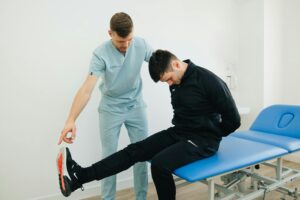Key Pointers:
- Back pain can arise from muscle strain, joint issues, or spinal conditions.
- Treatment depends on the cause and may include physiotherapy, medication, or spinal injections.
- Lifestyle changes such as posture correction and core strengthening, support long-term relief.
- In some cases, minimally invasive procedures may be advised.
- Early assessment helps identify the right treatment before symptoms worsen.
Why Does Back Pain Happen in the First Place?
Back pain can result from a variety of causes, ranging from simple muscle tension to conditions like slipped discs, spinal stenosis, or spondylosis. Prolonged sitting, heavy lifting, poor posture, and previous injuries all contribute to the strain.
Understanding the source of your pain helps your doctor tailor the most effective treatment plan.
What Are the First Steps in Treating Back Pain?
In many cases, the first line of management focuses on easing pain and reducing inflammation. Your specialist may suggest:
- Activity modification: Avoiding heavy lifting and long periods of sitting.
- Medication: Pain relievers or anti-inflammatory drugs to reduce discomfort.
- Heat or cold therapy: Applying warm or cold packs can help relax muscles and lessen stiffness.
These initial steps aim to control symptoms while the cause is being identified.
How Does Physiotherapy Help?
Physiotherapy plays a major role in back pain recovery. A trained physiotherapist may recommend:
- Stretching and strengthening exercises to improve flexibility and posture.
- Core stability training to reduce strain on the spine.
- Manual therapy or traction to ease pressure on affected nerves.
- Over time, physiotherapy helps restore normal movement and prevents recurrences.
Can Lifestyle and Ergonomics Really Make a Difference?
Yes. Simple adjustments often support long-term back health:
- Workstation ergonomics: Adjust your chair, desk, and screen to maintain a neutral spine.
- Regular movement: Take short breaks to stretch or walk every hour.
- Proper lifting techniques: Bend your knees, not your back.
- Weight management and regular exercise: Help reduce stress on the lower back.
When Are Spinal Injections or Minimally Invasive Procedures Considered?
If conservative care doesn’t provide sufficient relief, your specialist may discuss:
- Spinal injections – such as corticosteroid or nerve block injections, to reduce pain and inflammation.
- Radiofrequency ablation – to target specific pain-carrying nerves.
- Minimally invasive decompression or keyhole surgery – to relieve nerve compression caused by slipped discs or bone spurs.
These options are typically recommended only after imaging tests confirm the underlying issue.
What’s the Recovery Like After Treatment?
Recovery depends on the cause of your pain and the treatment used. Most patients benefit from continued physiotherapy and gradual return to normal activities. After minimally invasive procedures, downtime is generally shorter compared to traditional surgery, though full healing still requires patience and follow-up care.
FAQs About Back Pain Treatment
Q1: Can back pain heal on its own?
Mild strains may improve with rest, but persistent or severe pain should be evaluated to rule out structural problems.
Q2: Do I always need surgery for back pain?
No. Most back pain cases improve with non-surgical treatments such as physiotherapy, medication, or spinal injections.
Q3: How do I know if my back pain is serious?
Seek medical attention if you experience numbness, weakness, or pain that spreads to the legs, as this may indicate nerve involvement.
Q4: Are minimally invasive spine procedures safe?
When recommended appropriately, these procedures are designed to minimise tissue damage and promote faster recovery.
Q5: How can I prevent back pain from returning?
Maintain good posture, strengthen your core, stay active, and take breaks from prolonged sitting.
Book An Appointment For Your Back Care
Back pain may be common, but it shouldn’t be ignored. Knowing your treatment options, from simple lifestyle changes to targeted medical procedures, helps you make informed choices and protect your spine health for the long term. If back pain is affecting your daily life, a professional assessment can help identify the cause and suitable treatment.
📍 Mash Spine & Orthopaedics, Farrer Park Medical Centre
📞 Call +65 6518 9545 or Book a Consultation Here













